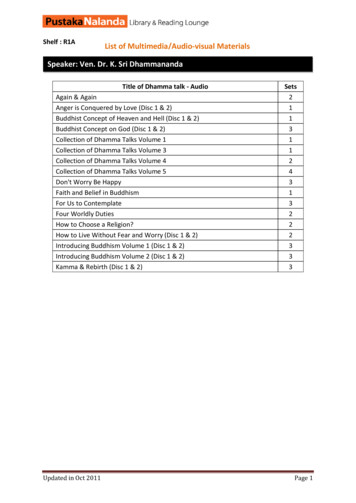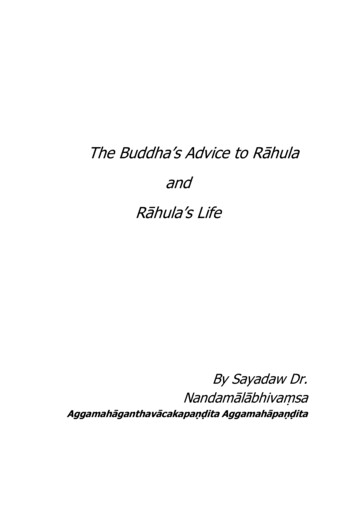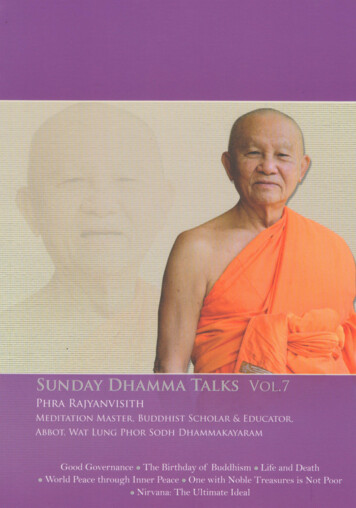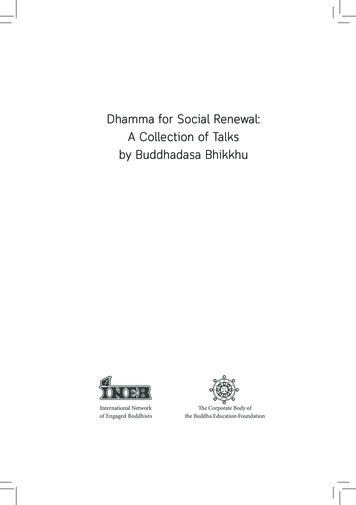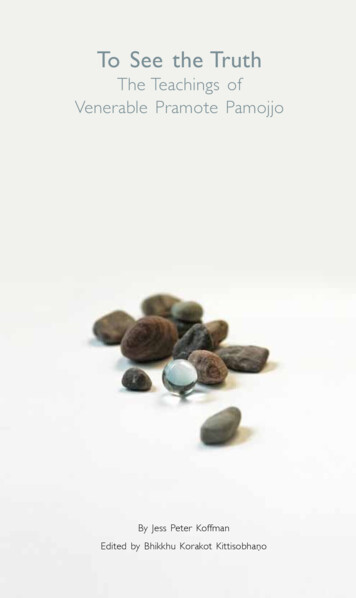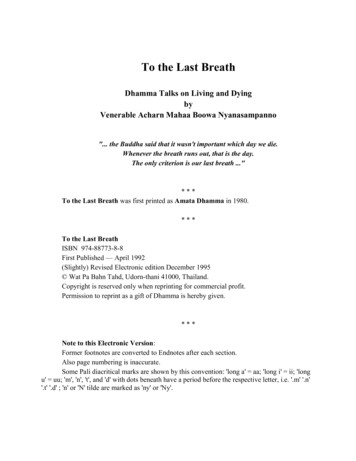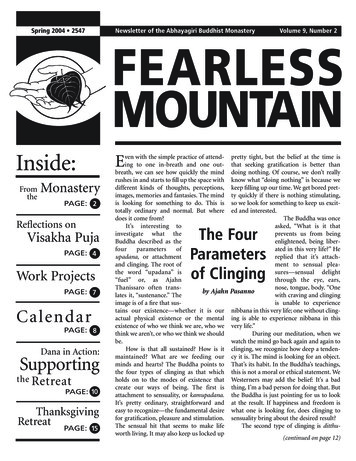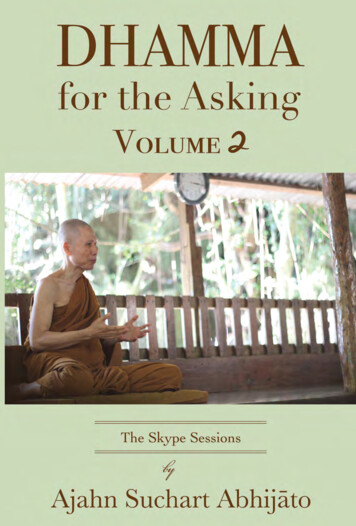
Transcription
“The Gift of DhammaExcels All Other Gifts”- The Lord Buddha -
Dhamma should not be sold like goods in the market place.Permission to reproduce this publication in any way forfree distribution, as a gift of Dhamma, is hereby grantedand no further permission need be obtained. Reproductionin any way for commercial gain is strictly prohibited.First printingISBNPrinted by::::February, 20154,100 copies978-616-7174-89-1Silpa Siam Packaging Printing Co., Ltd.61 Soi Phetkasem 69,Leabklong Phasricharoen Rd., (North),Nongkham, Bangkok, Thailand 10160E-mail: silpasiamprinting@hotmail.com
Content0102030405061215187117153199201Dhamma Talk and Q&A November 4, 2014Dhamma Talk and Q&A November 11, 2014Dhamma Talk and Q&A November 18, 2014Dhamma Talk and Q&A November 25, 2014Dhamma Talk and Q&A December 2, 2014Dhamma Talk and Q&A December 9, 2014AddendumGlossary
Dhamma Talk and Q&A November 4, 2014Dhamma TalkNovember 4, 2014When you are listening to a Dhamma talk,what you want to gain is understanding. If you canunderstand what I say, then you will remember it.If you don’t, don’t worry, because you don’t listen toDhamma talks just once. You have to keep listeningto Dhamma talks at least once a week, or morebecause when you listen to Dhamma talks, you willlearn something that you have not learned before,especially the practice of meditation. You wantto meditate. But do you know why? Do you knowwhat we get from meditation? Meditation inBuddhism consists of two parts. The first stage iscalled samatha-bhāvanā, meaning meditation forcalmness, for stillness of mind, for peace of mind.The second stage of Buddhist meditation, we callvipassanā-bhāvanā. This is for the development ofinsight. These two stages have to be achieved in orderto attain to the various levels of Dhamma. The goal— 1 —
is to let go of everything that you have right now,because all things that you have are temporary. Theyonly stay with you for a certain period of time andeventually will have to leave you, or you will have toleave them. If you know ahead of time that you haveto lose everything, and if you prepare your mind forthe eventuality, when these things happen, your mindwill not be affected. Your mind will remain peacefuland happy because you have already relinquishedand are detached from everything.What are you? You are the mind. The mind isnot the body. The mind comes into possession ofthe body at the time of conception in the womb ofthe mother. After nine months, the body and themind come to this world. So you have to understandthat the body is your temporary possession. One dayit will have to get sick. One day it will have toget old. One day the body will have to die. But themind is not the body, and the mind doesn’t get old,doesn’t get sick or die with the body. So what you haveto do is to teach the mind this truth because rightnow your mind is under the influence of delusion.Delusion is the mind mistakenly thinking that thebody is itself, so it clings strongly to the body. And themore strongly it clings to the body, the more stress,the more misery the mind will have. Once you knowthe truth that you are not the body, that you are justthe mind, you can exist and be happy without thebody.— 2 —
Dhamma Talk and Q&A November 4, 2014So you want to train the mind to detach fromthe body, not to cling to the body. And this is whatBuddhist meditation practice is about. It is to train themind to let go of the body and everything else. Andnot just your own body, but other people’s bodies aswell, like the bodies of your loved ones, your parents,your sisters and brothers, your husband, your wife,your children. They are all temporary. Sooner or laterthey will leave you, or you will leave them. But thisis okay, there is nothing wrong with the body. Thisis just how the body works. But the mind of eachindividual, like your father, your mother, your sister,your brother, your husband, your wife, your children,their minds don’t die with their bodies.So if I should find an analogy, the body is likea puppet, the mind is like the puppeteer (puppetmaster). The mind is the one who directs the bodyto do all kinds of activities. Like tonight, before youcould go to Wat Palelai, the mind had to instructthe body first, that tonight you were going to WatPalelai, and then you directed the body to take themind to Wat Palelai. If the mind hadn’t instructedthe body to go to Wat Palelai, then you wouldn’thave been there tonight. So this is the relationshipbetween the body and the mind. The body is temporary.The mind is permanent. So what you want to do istake care of your mind, teach your mind the truth,and train your mind to let go of everything. Becauseonce you are capable of letting them go, you will notbe sad when you lose them.— 3 —
So sitting in meditation is one way of lettinggo. When you sit in meditation, concentrate yourmind on one object such as a mantra. In Thailand weuse the recitation of the Buddha’s name: Buddho,Buddho, Buddho. This will prevent your mind fromthinking about this and that. And when you don’tthink, your mind becomes blank, and eventuallybecomes still. When your mind becomes still, themind temporarily lets go of everything. It lets go ofthe body and everything else because it has nothoughts about them. This is a temporary detachmentbecause you can only stay in this state of peace ofmind temporarily. When you meditate, your mindmay stay in absorption, for maybe 20 minutes,30 minutes or more, depending on your ability.But shorter or longer, sooner or later, you will haveto come out of your concentration and return to thebody. When you return to the body, then you willstart to cling to the body again.When you sit in meditation, your mindbecomes still; it stops thinking temporarily. You stopbeing aware of the existence of the body. So you aretemporarily detached from the body. But when youwithdraw from this meditation session, and you comeback to awareness of the body, you will start thinkingagain. And the delusion will start to direct you to clingto things again, to cling to your own body, and to thebodies of other people. So what you have to do afteryou come out of meditation is to instruct your mind— 4 —
Dhamma Talk and Q&A November 4, 2014to know that everything that you have, every personthat you know, they are all temporary. Sooner orlater you and everybody else have to depart from thisworld because everything is aniccaṁ, dukkhaṁ, andanattā. Aniccaṁ means temporary, impermanent.Dukkhaṁ means suffering/stressful. Anattā meansyou cannot control them, you cannot own them. Thisis how you have to instruct your mind when you arenot in meditation. And you have to instruct your mindto detach from everything—not just your body, butyour work, and everything that you have—becauseif you cling to them, you will be affected, you willwant them to be with you all the time. But when theyleave you, you will become stressful. So you have tomeditate a lot. When you sit in meditation, you willhave something better than what you have now.The happiness that you achieve from your meditationwill give you strength and the capability to let go ofeverything.So once you have this kind of happiness(happiness from meditation), then you can let goof everything. The reason why you still cling tothings and people is because you need them to makeyou happy. But once you have this happiness frommeditation, then you don’t need things and peopleanymore, you don’t need anything anymore, and youcan be happy not having to have anything. All youhave to do is know how to calm your mind, make yourmind peaceful, and make your mind stop creating— 5 —
desire from thinking. That is all you have to do. Onceyou have this ability, then you can live alone. You canbecome a monk. That is what monks do. We don’t relyon things or people; we rely on the happiness thatwe create from our meditation practices.You can do the same. What you need is time,because in order to achieve results, you have topractice a lot—practically all day, from the time youget up, to the time you go to sleep. Monks can do thisbecause monks don’t have other occupations. Monkshave no other work to do, so they can concentrateon their practice. When they are not sitting, theydevelop mindfulness by concentrating the mind onone object, either a mantra, or focusing attention onthe body. Watch your body movement from the timeyou wake up to the time you go to sleep. Couple the mindwith the body. Don’t let the mind wander here andthere. If you can maintain this level of concentration,when you sit in meditation, you can focus on yourbreathing and your attention will be continuous.It won’t take long—maybe five to ten minutes andyour mind can become still—and then you will havethe kind of happiness that the Buddha said is theprofound blissful happiness.This kind of happiness exceeds all other kindsof happiness. Once you have this happiness, then youknow that you can live alone, you don’t need anything.You don’t need anybody. So when you come out ofmeditation and your mind starts to desire things or— 6 —
Dhamma Talk and Q&A November 4, 2014people, tell your mind that what the mind desiresis in fact suffering and not happiness. This isbecause the things that the mind desires can onlybe possessed temporarily, not forever. When thingsthat you possess leave you or you lose them, youbecome sad again. So you don’t need these things.You can always go back to your meditation and havethe happiness within yourself.So this is what you have to do when you are notin sitting meditation. When you are not developingmindfulness, you should develop insight/wisdom,which means you have to look at everything asaniccaṁ, dukkhaṁ, anattā. If you see things asaniccaṁ, dukkhaṁ, anattā, you will stop your desires.You should tell yourself I don’t need it; I can behappy without it. Why should I get something thatlasts temporarily which I will have to lose sooneror later, and then when I lose it, I will be unhappy?This is what you should try to teach your mind.When the mind has desire for this or that thing,this or that person, especially when the mind stillhas sexual desire, you want to have a boyfriend ora girlfriend, or a husband or wife. That is becausewhen you are alone, you feel lonely. You feel thatif you have a friend, you can share happiness byhaving a sexual encounter. If you still have this feeling,then you should develop asubha kammaṭṭhāna. It isthe contemplation on the repulsive aspects of thebody. You are attracted to the body because you see— 7 —
the beautiful part of the body. But if you look at therepulsive part, then you can eliminate your sexualdesire. So this is another kind of insight/wisdomthat you have to develop if you have problems withsexual desire.This is basically what you want to do if you wantto have peace of mind all the time without havingany stress, any anxiety, worry, or fear. The mind haswisdom to instruct itself not to have attachmentto anything. We can still have things. We can stillhave people, know people, but so long as you arenot attached, your mind will not be affected whensomething happens to them. If your mind becomesanxious and worried, that means you already haveattachment, you have attachment to them to be likethis or like that. And when you feel that your desirescannot be fulfilled, you become agitated and unhappy.But the truth is we cannot control them, we cannottell them to be like this or like that. So if you don’twant to be unhappy or stressful, you should just letthem be, let them go, and not try to manage them.This is the goal of Buddhist meditation: torelease the mind from all kinds of stress, anxiety,unhappiness and sadness. You can do it, but you haveto put in time. It is like playing a sport such as golf;in order to be a good golfer, you have to put in a lotof time and practice a lot. If you only do it once in awhile, then you will not be able to enter professionalcompetitions. If you want to be a professional golfer,— 8 —
Dhamma Talk and Q&A November 4, 2014then you have to dedicate all your time to practice.It is the same way if you want to have completeelimination of stress from the mind: you will haveto practice all the time. And the best way to have thetime to practice all the time is to ordain as a monkor as a mae chee, in Thai for ordained women.Then you don’t have to worry about working andearning money because you will be supported bythe Buddhist community and provided with a locationor a space that is conducive to meditation practice.In order to achieve easy and quick results, you haveto live in a quiet environment, away from all thesights and sounds, the hassle and bustle of thingsand people. It is like living in the forest. The forestis where the Buddha achieved his enlightenment,and that is why the Buddha teaches all meditatorsto seek this kind of place if they want to achieveresults. So this is basically what I want to relate toyou tonight and end here so I can give time for youto ask me any questions.— 9 —
Questions &AnswersNovember 4, 2014Question 1: Lately after meditating, I find thatmy head is too heavy or pressurized. I have someonesaying that I am over-concentrating. So can PhraAjahn give some pointers in terms of technique toapply to relieve this pressure from the head?Tan Ajahn: First, you have to seek the middleway. Even though you have to put in the effort, youshould not expect too much. You have to find thebalance between exerting enough and not exertingtoo much. The problem is that when you sit, youexpect either very quick or very powerful results.Don’t worry about the results when you sit. Justtry to concentrate on the meditation object andlet the results happen by themselves. If they happen,fine; if they don’t, it doesn’t matter. Just developmindfulness. Just be mindful of your meditationobject; for example, if you are mindful of yourbreathing, just keep watching. When you are— 10 —
Dhamma Talk and Q&A November 4, 2014breathing in, be aware that you are breathing in.When you are breathing out, be aware that you arebreathing out. Just know. Don’t try to force yourbreathing. Use the breathing as an anchor, to tie yourmind, to prevent it from thinking about this and that.And whether you have results or not dependson your focus and concentration. The problem withpeople is that when they have to sit still, they tendto react, and they don’t like to be still. They are usedto doing all sorts of activities, and when they have tosit still, they become stressed. So maybe this is one ofthe reasons for your problem with your body whenyou sit in meditation. But you don’t have to worry;it is not a big deal. Just acknowledge it and come backto your meditation, come back to your concentration,come back to your focusing or meditation object.If you don’t think about them and don’t worry aboutthem, then you will not get distracted. Once youget distracted, you cannot go on. So forget abouteverything that might appear at the time of yourmeditation, only pay attention to your meditationobject. If you use breathing, just focus on yourbreathing, and ignore everything. Sometimes youmight feel an itch here and there, and sometimesyou might feel you are leaning too much to the frontor to the back, to the left or to the right. Don’t worry,don’t adjust your body posture. Leave it alone, keepon focusing and concentrating on your meditationbecause these are the distractions that you have to— 11 —
face in your meditation practice. And if you pay anyattention to them, you will lose your concentrationand will not be meditating anymore. So keep onfocusing/concentrating on your meditation objectonly, regardless of whatever you feel. If you feelitchy, forget about it; don’t try to scratch becauseif you scratch, you will keep on scratching. Just keepon meditating.Maybe when you first start, you might not seemuch progress, but the result that you have alreadyachieved is that you are able to sit for a while, tobe able to sit still and meditate. You have alreadyachieved something by doing this, and you have todo more and more, especially the development ofmindfulness. Before you come to sit in meditation,you first must have mindfulness if you want tohave any result. If you don’t develop or maintainmindfulness before you come to sit, when you sit,your mind will be wandering here and there. Yourmind will be thinking about this and that. And youwill find it very hard to focus on your meditationobject.So first of all you must try to develop mindfulnessin your daily activities from the time you get up. Whenyou start to get up, you must start your mindfulnessfirst. You should ask your mind: where am I? Am Iwith the body? Or am I with the mantra? Or am Ithinking about this or that? If the mind is thinkingabout this or that, bring it back. You can think,— 12 —
Dhamma Talk and Q&A November 4, 2014of course, if it is something important. Like you mighthave to plan what you are going to do today. But onceyou know what you are going to do, you should thencome back to the present, back to the body or backto your mantra, and continue with the daily activitiesmindfully: going to the bathroom, washing yourface, and brushing your teeth. Whatever you do,just be with that activity. This is what is meant bymaintaining mindfulness or developing mindfulness.Once you have the mind concentrated or fixed onthe body activity, when you sit down, you can usethe mantra or you can use the breath as yourmeditation object, and your mind will not wanderhere and there, thinking about this or that. And youcan get the mind to become still very easily and veryquickly.Question 2: Can you share with us the meditationmethod taught by Luangta Mahā Boowa?Tan Ajahn: Luangta Mahā Boowa taughtthe recitation of the Buddha’s name, Buddho,Buddho. That is what he used when he developedhis meditation. But he did not stop people fromusing other meditation objects, such as ānāpānasati.Sometimes he also instructed other people to useānāpānasati, meaning mindfulness of breathing.And he also taught people to be mindful of theirbodily activity. Whatever the body is doing, the mindshould be watching at all times because this is away of maintaining mindfulness. But when you sit,— 13 —
you can choose any meditation objects. You can usea mantra. You can use the breathing. Or, if you cannotconcentrate on your mantra or on your breathing,you can even chant or recite the Sutta in English orin Pāli, it doesn’t matter. This will let your mind havesomething to do and stop it from thinking about thisor that. And after you chant or recite for maybe halfan hour or an hour, you feel tired, and then you areready to focus on your breathing. Because whenyou feel tired, that means you don’t want to thinkanymore.So you have to adjust your meditation methodaccording to your situation. Sometimes your mindis restless; sometimes you might even have to usepaññā or wisdom to calm your mind. For instance,when you try to sit and meditate and then findyourself worrying about your job, friends, or family,then you have to use paññā or insight to look atthose things that are bothering you. You have tolook at them as aniccaṁ, dukkhaṁ, anattā, meaningyou cannot always have them be the way you wantthem to be. So if you cannot, then you have to let go.Maybe a friend is sick and may die. There is nothingyou can do. You have sent your friend to the hospitalto receive the best care by the physician, but you arestill anxious, you still worry, because you want himto be well. Your desire to want him to be well is thecause of your stress, your restlessness, your worries,and your anxiety. So if you look at him as aniccaṁ,— 14 —
Dhamma Talk and Q&A November 4, 2014dukkhaṁ, and anattā, that sooner or later he willhave to die, it will become clear that he is anattā:beyond your control. You are sitting here meditating,you cannot do anything, you cannot change anything.Once you see this clearly, your mind will let go, andthen your mind will become calm and peaceful andbe ready to meditate. So these are some of the thingsyou might have to do.Question 3: When we meditate to improveour well-being, is there any higher purpose to themeditation? If there is, what is it?Tan Ajahn: The well-being that you are referringto is the well-being of the body and the well-beingof the mind. Well-being of the body is, like I said,temporary, it is not permanent. What you want tohave is well-being of the mind. The mind that isalways peaceful and happy, having no stress, realizingthe cessation of all forms of stress or suffering andthe end of all rebirths. This is the goal of Buddhistmeditation. Because if you still have to be reborn,then you still have to get old, get sick and die. So theBuddha said the goal is not to be reborn. In ordernot to be reborn, you have to eliminate all forms ofdesire. The Buddha mentioned three forms of desirethat are the cause of your rebirth. Kāma-taṇhā meansthe desire for sensual pleasure, bhava-taṇhā meansthe desire to become this or that, and vibhava-tanhāmeans the desire not to become this or that.— 15 —
So these are the three desires that you have toeliminate and you can do this with samatha-bhāvanāand vipassanā-bhāvanā, or in other words, samādhiand paññā that you are doing right now. Right nowyou are developing paññā. Paññā can arise fromlistening to Dhamma talks. When you listen toDhamma talks, you get to know the way to eliminateyour desire. The next step is to remind yourself ofwhat you have heard. That is because if you don’tremind yourself by contemplating what you haveheard tonight, you will forget. Keep on repeating,reminding yourself what you have heard tonight,what you have understood, and then try to apply thisknowledge that you have learned to your life.When you become attached to something orsomeone, then you must use this knowledge todetach your mind from them. If you can detach yourmind, then you don’t have any desire for them to bethis or that because you know eventually they willbe whatever they will be. If the body has to get old,get sick, or die, regardless of whatever you do, youcannot stop this process. So this is paññā. We callthem the three levels of paññā. The first level is thepaññā that arises from listening to the Dhamma talk;in Pāli we call it suttamaya-paññā. Then you take thisknowledge that you have heard from the Dhammatalk and repeat it in your mind, contemplating againand again, this is call cintamaya-paññā. Like tonightyou have heard that you have to let go of everythingbecause everything is aniccaṁ, dukkhaṁ, anattā.— 16 —
Dhamma Talk and Q&A November 4, 2014If you take this knowledge and try to contemplateit in your daily life, whatever you do, try to keep inmind that everything is aniccaṁ, dukkhaṁ, anattā.You must not have any attachment to them. Youmust not have any desire for them to be this or that.If you can remind yourself of this all the time, whenyou have to interact with them, you will interact withthem in a way that will not cause any stress.Question 4: Does the desire to achieve concentration result in blocking the relaxation of the bodyand mind?Tan Ajahn: When you meditate, don’t have anydesire. The only desire you should have is to focuson your meditation object. Don’t have the desire toget results, because this will make you worriedor anxious. You are sitting here for a few minutesand then you start worrying When will I get calm?Or When will I get the result? When you startthinking like this, you are not meditating anymore.So forget about the result. What you have to do isjust maintain mindfulness, focusing your mind onone meditation object, and then this meditationobject will lead you to the result eventually.Question 5: After prolonged meditation, withmindfulness of the breath, I get a very strong nauseousfeeling, which persists for a number of hours or a fewdays, during which eating has to be forced. So howdo I manage this?— 17 —
Tan Ajahn: When you go to the movies, do youexperience this?Lay: No, Tan Ajahn. Only after meditation, butgoing to the movies, I’m ok.Tan Ajahn: So it is your defilement. It is yourdesire or your kilesa reacting. It wants to preventyou from meditating, so it creates this obstacle. Youshould ignore it because other people don’t havethis kind of experience.Question 6: Does Tan Ajahn have any messagefor us?Tan Ajahn: Just keep on practicing. The practicewill give you the result; giving up will never give youthe result. You have to be patient and avoid the trapof expecting this to happen overnight. Many monkshave to spend many years before they can becomeenlightened. Ajahn Mun became enlightened when hewas over 60 years old, when he went to stay alone inthe forest of Chiang Mai. So this is not something thatwill come easily. But it will come if you are steadfastwith your practice. So just keep on practicing. It islike eating, if you only eat one or two spoonfuls offood and then stop, you will never be full. But if youkeep on eating, eventually you will become full. It isthe same way with the practice. You should just keepon practicing, putting in as much time as possible.Because if you practice one hour a day, it is very little,— 18 —
Dhamma Talk and Q&A November 4, 2014compared to the time that you spend doing otherthings during the day. So you have to put in moretime. That is all the advice I have for today.End of Desanā and Q&ASādhu Sādhu Sādhu.— 19 —
Dhamma Talk and Q&A November 11, 2014Dhamma TalkNovember 11, 2014Like I said during last week’s talk, when we arelistening to the Dhamma talk, we should concentrateon just listening. Don’t pay attention to any otherthing, don’t do anything, don’t talk, and don’t thinkabout other things. Just focus your attention on theDhamma talk that you are listening to. If you can dothis, you will absorb the Dhamma into your heart.From listening to the Dhamma talk, you can achievetwo different goals. One, if you cannot understandwhat you are listening to, but you concentrate onlistening to the voice of Dhamma, the voice of Dhammacan calm your mind and make your mind calm andpeaceful. Two, if you can understand the Dhammatalk, the reason, the cause and effect, then you cangain paññā (insight or knowledge).The knowledge in Buddhism consists ofthree levels. The first level is called suttamayapaññā,knowledge that you learn from listening to a— 21 —
Dhamma talk. The second level of knowledge is calledcintamayapaññā, the knowledge that you acquire bycontemplating or thinking about Dhamma. The thirdlevel of knowledge is called bhāvanāmayapaññā,meaning the knowledge that you apply in eliminatingyour mental suffering, your stress, anxiety and worry.The knowledge that you acquire from listening is notstrong enough yet to eliminate the stress and thesuffering in your heart. From what you have learnedand what you have heard, the next step is to contemplatethem so it stays with you in the mind. Once it stayswith you in the mind, when you want to apply it toeliminate your suffering, you can readily do it.What we have to contemplate all the time isthe impermanent nature of things. Things are notpermanent. They don’t last forever. Sooner or laterthey will leave you or you will leave them. Therewill be separation from things and from peoplethat you love. If you are not ready, if you have notprepared yourself for this, when it happens, it cancause sadness, sorrow and lamentation in your heart.But if you are constantly observing your mind,reminding yourself that you live in an impermanentworld, in which there will be separation, if you justkeep on reminding the mind of this, then you willnot forget. You will then prepare the mind for theseparation. When the separation happens, the mindwill not be affected. Instead, it will just be calm andpeaceful, acknowledging the truth that sooner orlater we will all have to go our different ways.— 22 —
Dhamma Talk and Q&A November 11, 2014We can see this in the life cycle. The mind andthe body come together at the time of conceptionand stay together in the womb of the mother. Whenthe body and the mind leave the womb, the mind isthe master, the body is the servant. The mind directsand tells the body what to do, like tonight your mindtold your body to go to Wat Palelai. If you didn’t tellthe body to go there, your body would not be there.If you told the body to go to your friend’s houseinstead, then the body would be at your friend’shouse, and not at Wat Palelai. So the mind is themaster, the one who controls the body. But it cancontrol the body only to a certain extent. There arethings in the body that the mind cannot control,that is, the process of aging, sickness and death.These are beyond the ability of the mind to control.If the mind clings to the body and has desire forthe body to last forever, to not get old, to not get sickor die, then when the body gets old, gets sick, or dies,the mind will be unhappy.Some people with terminal cancer may be toldthat they only have three months to live. Their mindmay have already lost the appetite to live when in factthe body can still last for three months. And thereare a lot of things you can do in these three months.But when people don’t have the Dhamma, they don’tknow how to cope with this situation. All they dois to look for ways to cure the cancer. And if theycould, they would end their lives because they don’twant to go through the physical pain. But if you have— 23 —
studied the Dhamma, and learned how to cope with theaging, sickness, and death of the body, you will not beaffected by what is happening to the body. So this iswhat we come to do: train the mind to cope with theeventuality of the body, that one day the body willhave to get old, one day the body will have to get sickand it will be painful. But the mind can rise above,can transcend this sickness and physical pain if themind knows how to stay calm.This is where meditation comes into play.We sit in meditation in order to calm our mind.We are l
01 Dhamma Talk and Q&A November 4, 2014 1 02 Dhamma Talk and Q&A November 11, 2014 21 03 Dhamma Talk and Q&A November 18, 2014 51 04 Dhamma Talk and Q&A November 25, 2014 87 05 Dhamma Talk and Q&A117 December 2, 2014 06 Dhamma Talk and Q&A Dec
